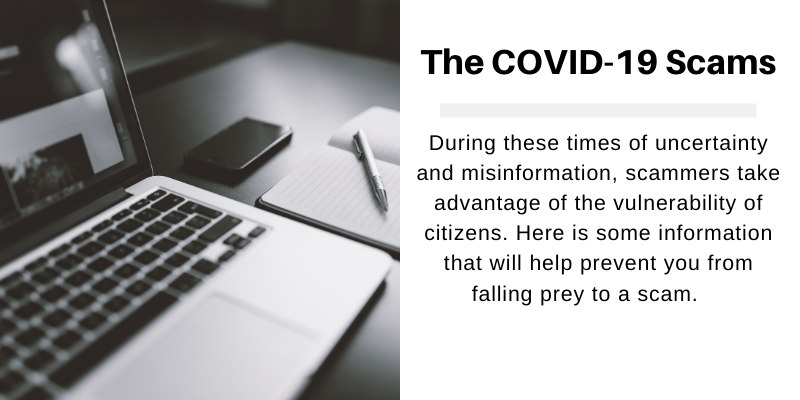The COVID-19 Scams

Scammers and hackers may exploit concerns regarding COVID-19 in order to obtain personal information or demand money. Beware of individuals using fraudulent information.
Common scams:
- Fraudulent texts, emails, social media posts with links for coronavirus information that install malware on a device to steal personal information, including passwords and credit card numbers
- Fraudulent websites related to the virus outbreak, including fake online stores selling protective wear and household supplies
- Fraudulent calls, emails, websites seeking charitable donations
- Communications promoting fraudulent treatment information
- Calls demanding money for treatment for family members with the virus
- Fraudulent communications offering investment advice or information on the economic impact of COVID-19
- Individuals posing as a family member or friend and seeking money for an urgent matter
Helpful tips:
- Beware of any calls, emails or other communications with “urgent” demands for money or seeking to verify personal information
- Carefully review any emails or correspondence from organizations seeking charitable donations
- Make charitable donations directly on the organization’s website
- Beware of solicitations for money over the phone
- Never send money to a person you do not recognize or cannot verify their identity
- Beware of fraudulent emails that appear to be from reputable sources
- Check URL link (official government publications end in .gov), email addresses and spelling errors
- Do not download attachments or click on links in unsolicited emails or from unknown senders
- For updates and new information on COVID-19, the official sources are:
- Massachusetts Department of Public Health, www.mass.gov
- Centers for Disease Control and Prevention, www.cdc.gov
- World Health Organization, www.who.int
If you believe you have been a victim of a scam, contact your local police department.

